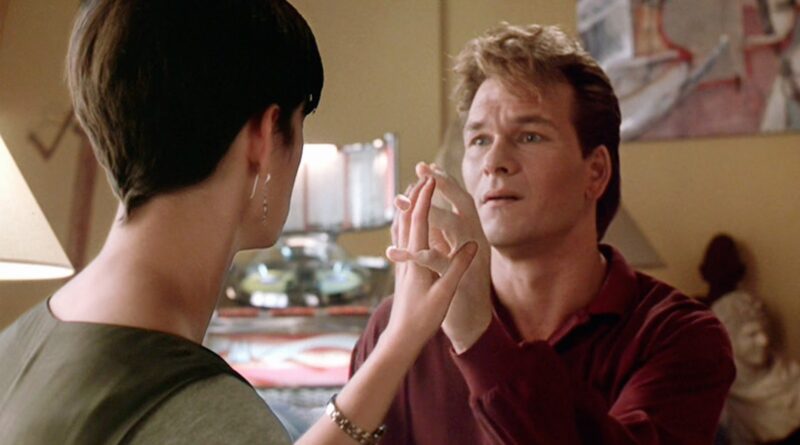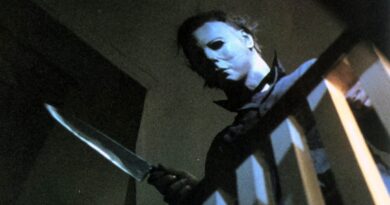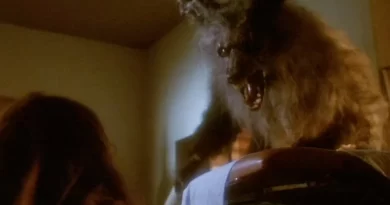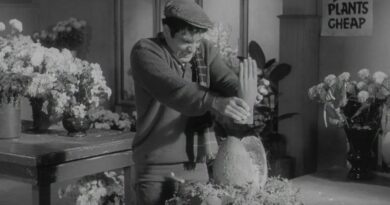Ghost (1990)
It’s a well known fact that comedies can have serious moments, and dramas can have moments that make us laugh. But if such films are to be successful, there has to be a seamlessness, a sense that both are interwoven in the fabric of the human condition. With Ghost, that seamlessness just isn’t there; it’s dramatic and it’s funny, but in such a way that two completely different movies seem to be fighting for the same space. On the one hand, we have an unashamedly sentimental romance crossed with a murder mystery. On the other hand, we have the antics and one-liners of Whoopi Goldberg, with some help from Patrick Swayze. The very fine thread tying the two together is, as the title plainly spells out, the ghost of a man visible to the audience but not to any of the characters – with the obvious exception of those who are also ghosts.
His name is Sam Wheat (Swayze), and wouldn’t you know it, he didn’t enter the obligatory beam of light from the sky after being gunned down in a slummy area of New York City. At first, it seemed like a random robbery gone wrong. But he quickly learns that he was targeted, and he makes it his mission to find out why, how, and by whom. Of course I’m being vague for the sake of this review, but if you see the film, you will find that the whom part is immediately obvious. So obvious, in fact, that it forced me to wonder if the filmmakers were making it a point to not try very hard. What takes longer to figure out is the why part – but not much longer, given that, early on, we see a still-living Sam doing very well for himself as a banker.
Goldberg plays Oda Mae Brown, a phony spiritual medium who accidentally, and rather ironically, discovers she does in fact possess a true sixth sense, namely the ability to hear, but not see, Sam. Indeed, much of the film’s humor stems from scenes between her and Sam, since, to everyone else around her, she seems to be talking – and in many cases, bickering – to herself. Anyway, being the only mortal in this story capable of any postmortem communication, Sam must rely on Oda Mae to help him with … a little scheme he has cooked up. I won’t go into specifics, lest I spoil the plot point everyone will figure out early on. Let’s just say that Sam takes her to his former bank and coaches her on what to say to the exact right people.
He must also rely on Oda Mae to convince his grieving girlfriend, a successful ceramic sculptor named Molly (Demi Moore), that he’s still there with her – and that she’s in danger. Of course Molly is initially not going to take Oda Mae seriously. And of course she will eventually be convinced that Oda Mae is the real deal, despite the fact that she has a lengthy criminal record. Further helping Sam convince Molly is knowledge about using your emotions to move objects that ghosts would normally pass through. He learns this from an angry, paranoid subway ghost (Vincent Schievelli), who was pushed in front of a moving train and misses being able to smoke. This raises questions about the rules under which ghosts operate in this story, such as why they’re able to pass through doors and walls but can walk on any floor and sit in any chair. I guess some things are better left unexplained.
The film is a departure for director Jerry Zucker, part of the creative team behind some of the most gloriously absurd, ceaselessly goofy comedies of the 1970s and ‘80s, including The Kentucky Fried Movie, Airplane!, Top Secret!, and The Naked Gun. The humor he applies to Ghost is different; it’s not about summoning the silliest of gags out of thin air or parodying scenes from popular movies, but rather playing off of character quirks and the situations people find themselves in. In other words, the comedic moments in this film are more traditional. This isn’t a bad thing in and of itself. Neither, of course, is comedy in general. The problem is that this isn’t a story that can be both a comedy and a drama. It needed to be one or the other.
As ghost movies go, the film is surprisingly light on special effects. This isn’t a criticism so much as an observation. But the effects we do get are pretty good; aside from the expected shots of Swayze passing through walls and doors, I was especially impressed with shots of shadows turning into dark entities that drag evil ghosts away. To where, I don’t know, but it certainly isn’t to the place the beam of light leads to. The long and short of it is that Ghost is a serviceable date-night movie – and as such, the ending will, for a lot of people, require a box of tissues. But if your cinematic tastes are more discerning, you’re likely to feel that the film isn’t all that it could have been. A decision over whether to make the film purely funny or purely dramatic would have helped greatly.




